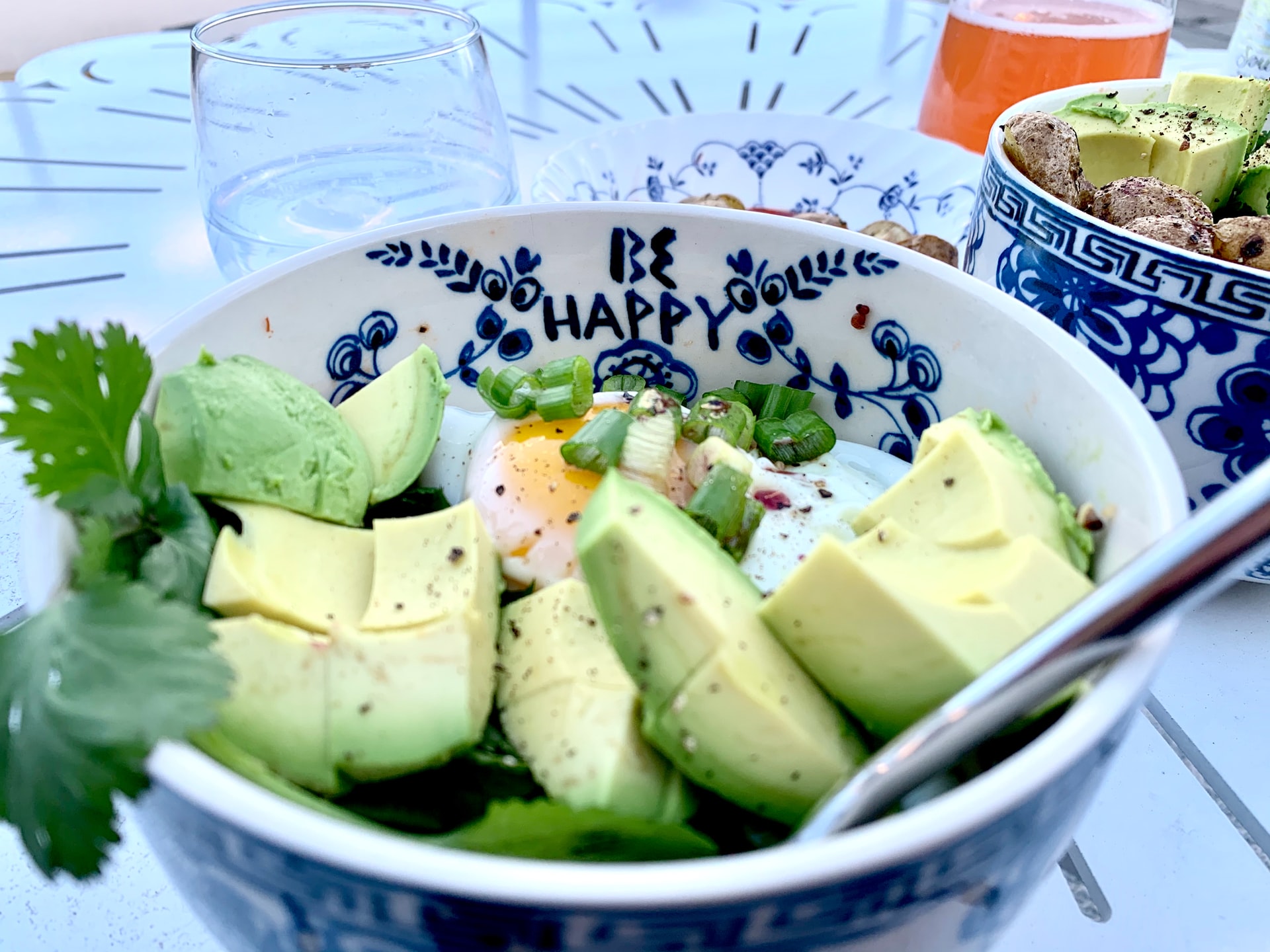7 ways to give your body what it needs rather than what it wants during lockdown…
3 years ago
Life3 years ago
Life
Has lockdown life changed the way you're eating and drinking? Are you experiencing tension headaches, poor sleep and mood swings? Then the two things could be related, as nutritional therapist Angelique Panagos explains…
If you’re drinking more alcohol than usual in your Zoom quarantinis; finding yourself going all-out on the comfort food and ditching the exercise, you’re more than likely tuning in to what your brain is telling you it wants rather than what your body and brain actually needs.
You’re certainly not alone, either. There has been 291% increase in sales of alcohol since the lockdown began, according to global data analytics company Neilsen , and boredom, stress and time spent at home mean a lot of us are snacking more frequently and more haphazardly than pre-lockdown.
The knock-on effect of stress, anxiety and what we’re all consuming has to come out somewhere; and for many, it’s through physical symptoms – our moods are all over the place, our sleep has gone up the spout and we’re getting headaches (there has been a 250% increase in searches for tension headaches since lockdown began).
So, just what can we do to help ourselves right now? We turn to registered nutritional therapist and author of The Balance Plan: Six Steps To Optimize Your Hormonal Health , Angelique Panagos , for her advice.

“Humans are creatures of habit but everyone is out of their usual routine,” says Angelique. “For example, you may not be used to working from home, and this can be difficult to adapt to if you’ve never done it before. You may feel lonely and struggling to find a new structure to your day. Meanwhile, the fridge and possible temptation is only a few steps away.”
A rise in the stress hormone cortisol will have a knock-on effect on the work of your other hormones
Top this off with stress, anxiety and uncertainty about the future, and it can have an unsettling effect on your brain, which may drive you to unhealthy behaviours.
“For example, if your brain thinks you need comfort or that you’re stressed, tired or bored, you can end up over-eating or drinking too much alcohol,” says Angelique. “This can lead to dehydration, headaches, weight gain, poor sleep, and hormonal and mood swings.”
“Even before the pandemic began, we were working at a 100 miles per hour and living with chronic stress,” says Angelique. “Chronic stress doesn’t just go away because a pandemic turns up – instead, it’s amplified.
“Where it gets interesting is that a rise in the stress hormone cortisol will have a knock-on effect on the work of your other hormones. For example, when cortisol levels are high, your body produces less melatonin, which is the sleep hormone that helps your body feel sleepy and controls your sleep-wake rhythms. This has a knock-on effect on the quality and length of your sleep. It’s a delicate balance.
“ High levels of cortisol also affects insulin , a hormone that regulates the amount of glucose in your blood, and one that also has a knock on effect on other hormones in the body. This can lead to blood glucose highs, and then lows – leaving you feeling hangry with mood swings, and turning to high-sugar foods as a result, which leads to more blood sugar peaks. You’re then caught in a vicious circle.”
Want to stop the cycle? Here are Angelique’s 7 tips for helping our hormone balance right now…
“Right now, it’s important to tuck into nutrients that help to support the immune system and ensure that your body thrives,” says Angelique. “This means eating so you have energy, motivation, concentration and good sleep, plus balanced moods and hormones.”
What to do: Aim for an 80/20 balance. “So, for 80% of the time avoid refined sugars and refined carbohydrates and instead tuck into the following types of food: complex carbohydrates, like wholegrains, sweet potato, butternut squash; good sources of protein: for example fish, eggs and pulses; fruit and vegetables and good quality fat, like nuts, olive oil and avocado. “Then, for 20% of the time you can still enjoy your more indulgent choices and your body will be fine.”
“These are uncertain times, and while we can’t take the stress away, we can change our reaction to it, reduce our perception of the stress and also reduce the stress response (cortisol) in the body,” explains Angelique. This will help not just by reducing comfort-eating and improving your sleep, but also balance your hormones and mood swings – so helping your relationships with those you’re living with right now.
What to do: Try deep breathing exercises every day. “Deep breathing stimulates the parasympathetic nervous system,” explains Angelique. “This helps lower stress, while ensuring you feel more grounded.”
Angelique likes the 4-7 technique, which is something we can all try without much effort: slowly breathing in for a count of four and then breathing out for a count of seven and repeating this for 20 reps. “I recommend you do this four times a day – on rising, mid-morning, mid-afternoon and just before you go to sleep. Oh, and any time you feel stressed, do another 20 reps.”
“Eating too many high sugar or refined carbohydrate foods can lead to feelings of ‘hanger’, mood swings, and disturbed sleep,” says Angelique. “It’s a vicious circle as you then eat more of those foods and get even less sleep.”
And yes, alcohol counts as a sugar, she says. “If you’re sat at home drinking more than you normally would or than is beneficial for your body, it will exacerbate anxiety, mood disturbances, PMS and other hormonal symptoms and conditions, like polycystic ovaries for example.”
What to do: To smooth out your blood glucose levels, follow Angelique’s healthy eating principles 80% of the time, making sure you choose complex carbs rather than refined carbs, and plenty of fruit and veg and drink lots of water.
“Try limiting alcohol to three times a week, use smaller glasses and just enjoy it,” she says. “It may help to think about why you want it too – is it to wind down or as a crutch?”
Listen to your body’s satisfaction signals when it comes to meals so you stop eating when you’re full – a way of eating called intuitive eating . Eating like this can also help you understand why you need that sweet food and that it’s fine. “Sometimes your body says it needs ice cream, and if you’re mainly eating a healthy, nourishing diet, go for it,” says Angelique.
Tuning into your body can also help you stay hydrated. By noticing the colour of your urine and drinking before you get thirsty, you can make sure you get your recommended eight glasses of water a day, says Angelique.
What to do: “Make sure you focus on the ice cream while you are eating it, enjoy it and then move on. Don’t beat yourself up about it, or feel you failed in some way,” says Angelique. “Don’t give it too much power or brain space. You gave your body what it needed at that moment and that’s great. Now get on with your day.”
“The power of a good night’s rest is so under-rated,” says Angelique. “When you sleep, your body rests, repairs and reboots.”
One of the problems is that right now, you might be finding yourself spending more time looking at your phone well into the evening – whether it’s scanning news feeds or checking in with friends. But research shows that the blue lights from our phones and other electronic devices keeps us awake by keeping cortisol active.
“Cortisol should work like the sun – rising in the morning and setting in the evening,” says Angelique. “But if you’re continually looking at the blue light and responding to messages, emails or texts, your body doesn’t stop producing cortisol and this in turn can reduce melatonin production. Without melatonin, you won’t get a good restful nights sleep.”
What to do: “Put your phone away two hours before bedtime and invest in blue-light blocking glasses for any evening screentime,” says Angelique. “And focus on good sleep routines. So avoid stimulants like coffee, tea or high-sugar desserts at night, and make sure your room is well-ventilated and dark, or wear an eye mask.”
If you’re struggling to exercise since lockdown started, give it another try. Working out can curb stress hormones, boost your mood and support immune health , while also regulating appetite . Try a Jennis home workout too. “It makes it easy to exercise in the comfort of your own home, in bad weather and around your children’s school or nap schedules,” says Angelique.
What to do: “If you haven’t exercised for a while, start by simply going for a walk in the fresh air,” says Angelique. “Being out in nature has benefits for not just your mental and physical health but also your immune system. A gentle run, stretching or indoor workout will also boost endorphins.
“Remember that you should always feel better after a workout. That's where the caveat comes in. You need to work out your own exercise sweat spot – too much or excessive exercise can cause a negative effect on our hormones and even lead to menstruation irregularities or periods stopping.”
You can also try one of the ‘At Home With Jess’ garage-cam circuits Jessica Ennis-Hill has been putting out every week since lockdown.
It’s important to be realistic and kind to yourself during this time, so don’t go for a dramatic overhaul of your routine. “Instead, set small, achievable goals that will make it easier to achieve your target,” says Angelique. “This will set you up for success.”
“Make sure your goals are realistic. For example, if you’re not eating any vegetables, don’t decide to suddenly start eating five-a-day – instead, prioritise eating one vegetable a day instead.”
And when you achieve a goal? “You definitely need to celebrate your wins,” says Angelique. “Reward yourself with a chat with a friend, a home pedicure, an extra-long soak in the bath or a new book you can get stuck into. A reward should be a way of nourishing the whole body.”
What to do: Think about which habit is bothering you the most and go from there. So increase your step count by 1000 steps a day, phone a friend rather than having a morning snack and so on.
“Finally, you need to remember that any positive steps that you make right now might not seem that big, but with the pressure we’re all under, they make a big difference, so give yourself a massive pat on the back for whatever you do to help your hormone balance and health.”
Q&A: Jessica Ennis-Hill and Angelique Panagos – Want to find out more about your hormones, nutrition, how you’re feeling and how it’s all connected? Got a specific question you want Angelique to answer? Then email us at: editorial@jennisfitness.com and we’ll make sure your question gets answered by Jess and Angelique in their Q&A next week.
 Cycle syncing
Cycle syncing Perimenopause
Perimenopause Perimenopause
Perimenopause Perimenopause
PerimenopauseSign up to learn everything you need to know about CycleMapping, plus how you can live better and feel better through optimising your fitness to you.
This website uses cookies to ensure you get the best experience on our website. Learn more

Sign up for the very latest news on women's fitness, health and hormones, plus be the first to receive exclusive offers and extras